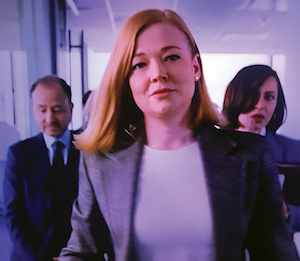 |
| T.J. Winick |
The award-winning series focusing on the uber-dysfunctional Roy family and its empire of cable news channels, theme parks and—of course—cruise ships, has been as captivating as anything on television through three tumultuous seasons. Viewers keep coming back for its over-the-top portrayal of the rich and infamous, complete with exotic locations, dark humor and Machiavellian infighting.
Among the show's rabid fanbase are some PR pros and crisis communicators, including yours truly who—dare I say—may see a little bit of themselves in the characters Karolina Novotney, head of PR for Waystar Royco, and Hugo Baker, Senior Vice President of Communications in the parks and cruises division.
While the made-for-TV drama is just that, there are many facets of crisis communications accurately portrayed on the show. Here are my top five:
| This article is featured in O'Dwyer's Jan. '22 Crisis Communications & PR Buyer's Guide Magazine (view PDF version) |
Senior communicators as part of the inner circle
The best crisis managers are valued by the CEO as indispensable counselors. Their recommendations on strategy and language are informed by institutional knowledge of the business, a keen understanding of what constitutes a strong reputation, how the media works and how the public consumes information.
No matter the locale in "Succession," PR is there: at the office, at Connor's New Mexico ranch and at Shiv's wedding in England. Karolina is even at the hospital to set up a communications war room after Logan suffers a stroke. Hugo may not show up until halfway through season two, but he has Logan's ear from the get-go. He's by his side throughout the Argestes conference and is part of the inner circle sequestered with him at a Sarajevo hotel before the coast is clear for a return to New York.
Crisis meetings aren't always orderly
In pop culture, crisis meetings tend to be portrayed as one heroic team member standing up and making an impassioned plea that sways the entire room. In real life, that almost never happens.
The tone of a crisis meeting is set, more often than not, by how the CEO likes to make decisions. Is it by going around the table and hearing from everyone? Do they call on certain individuals in the room? Or, is it more of a free-for-all with participants endorsing or taking issue with a particular perspective or recommendation? Most of the time, like in "Succession," it's multiple advisors offering input or answering questions from the CEO who, as the ultimate decision-maker, takes or leaves that counsel.
Threatening the media rarely works
 Siobhan "Shiv" Roy, Waystar Royco President of Domestic Operations, flanked by Waystar PR counsel Hugo Baker and Karolina Novotney. Siobhan "Shiv" Roy, Waystar Royco President of Domestic Operations, flanked by Waystar PR counsel Hugo Baker and Karolina Novotney. |
In season two, with the Roys on the brink of a major acquisition, Hugo informs them that New York magazine plans to publish a damaging exposé on a past cruise line issue and has reached out for comment. After Kendall asks if they can "kill" the piece and Shiv suggests a strategy to delay the story, Logan settles on unleashing a team of lawyers to intimidate the magazine, including issuing a cease and desist letter.
It's only after the salacious story posts that the Roys seriously consider how they should respond to the allegations: "It's something and we'll fix it or it's nothing and !@#$% off."
When leaders view media coverage as a personal attack, as Logan does, they'll let emotion cloud their judgment and be tempted to slap back. As in "Succession," it rarely has the desired effect. In fact, it signals to reporters and editors that they've struck a nerve. Like responding with "no comment," it suggests you have something to hide.
The best defense is a good offense
While crisis and issues management is primarily a defensive discipline, there'll be times when playing offense is the right move. Instead of waiting for negative media coverage, consider what opportunities exist to drive the storyline. It's not conventional thinking to consider a genuine branding opportunity in the middle of a crisis. However, if the circumstances are right, there may just be opportunities that could result in a fresh round of positive news coverage when you need it most.
Kendall, in particular, subscribes to this theory. After turning the tables in the season two finale, he grants an exclusive sit-down interview with a newspaper reporter. Continuing to push his agenda, he even intends to go on a news-parody TV program that's been particularly harsh in its criticism of him, all in a bold attempt to change the narrative.
Never go dark
While there are plenty of high-stakes PR moments on "Succession," such as interviews and press conferences, the reality is that most crisis responses begin with a written statement.
After Logan suffers a stroke, for instance, Karolina acquiesces to the family's unwillingness to release an update on his condition, though her instincts are correctly focused on their fiduciary responsibility to shareholders. Gerri, then General Counsel, also wants to get ahead of the next morning's opening bell and media coverage that could significantly impact WayStar Royco's stock price.
A written statement offers the ability to have complete control over the message without having to answer any questions. It's the most efficient method of getting out your position and one that entails the least amount of risk.
Lucy Prebble, an Executive Producer of "Succession," noted on the show's official podcast that its showrunner and writers aim to ground the drama in reality. In addition to the very distinct observational, cinéma verité direction, it's how crisis decisions are made—and how some of those decisions play out—that lends the show some of its authenticity in an otherwise mad, mad world.
***
T.J. Winick is a Senior Vice President at Solomon McCown & Cence, a strategic communications, public affairs and digital firm headquartered in Boston.


 There’s a fine line between newsjacking and taking advantage, aka ambulance chasing. Our job as PR professionals is to tread it carefully.
There’s a fine line between newsjacking and taking advantage, aka ambulance chasing. Our job as PR professionals is to tread it carefully. PR firms need to be mindful of ways their work product may be protected by the attorney-client privilege whenever working with a client’s internal legal team or its external legal counsel.
PR firms need to be mindful of ways their work product may be protected by the attorney-client privilege whenever working with a client’s internal legal team or its external legal counsel. Manuel Rocha, former US ambassador and intenational business advisor to LLYC, plans to plead guilty to charges that he was a secret agent for Cuba.
Manuel Rocha, former US ambassador and intenational business advisor to LLYC, plans to plead guilty to charges that he was a secret agent for Cuba. CEO mentoring is an often-overlooked aspect of why CEOs are able to make good decisions, and sometimes make bad ones—all of which intersects with the role and duties of a board.
CEO mentoring is an often-overlooked aspect of why CEOs are able to make good decisions, and sometimes make bad ones—all of which intersects with the role and duties of a board.  How organizations can anticipate, prepare and respond to crises in an increasingly complex world where a convergent landscape of global challenges, threats and risks seem to arrive at an unrelenting pace.
How organizations can anticipate, prepare and respond to crises in an increasingly complex world where a convergent landscape of global challenges, threats and risks seem to arrive at an unrelenting pace.


 Have a comment? Send it to
Have a comment? Send it to 
No comments have been submitted for this story yet.